Can You Pick Piano Up Again
If you're new to electronic music production, Ableton Live and FL Studio are two of the most popular DAWs – the beating center of the producer'southward studio.
These two are bully options (we use both in EDM Foundations), and as someone who has used them extensively over the years, in this guide I'll assistance you decide which is better for you. We'll encompass:
For clarity, we've cleaved this article down into five parts.
- Features
- Workflow
- Compatibility
- Support and Resources
- Price
Recall, in that location is no universal all-time DAW, only the one that's correct for you. So, permit'southward break them down! 👇
Go the headstart you need in music production with our EDM Starter Kit
Get our collection of high-quality presets, samples and PDF guides – suitable for all genres of electronic music.
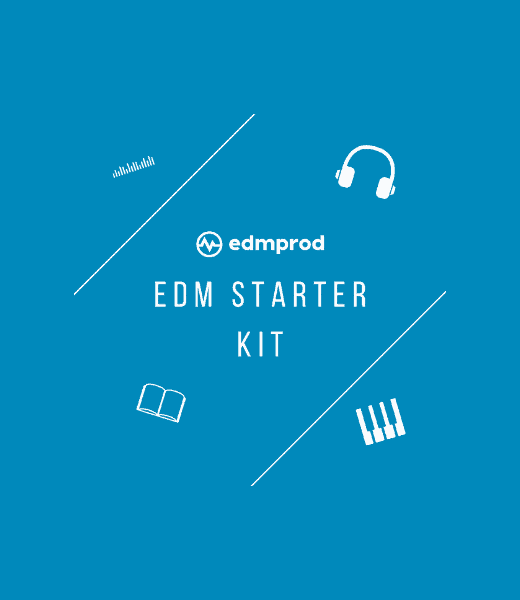
Ableton vs FL Studio: Features
Ahh, every music producer's favourite role. The features.The part that makes music production fun and enjoyable for most people.
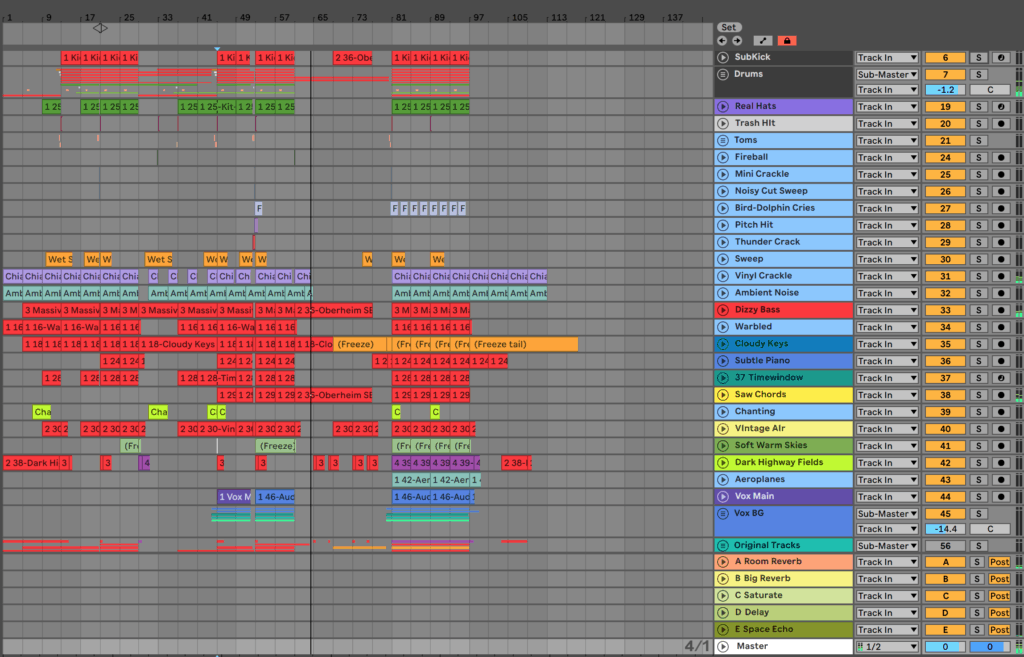
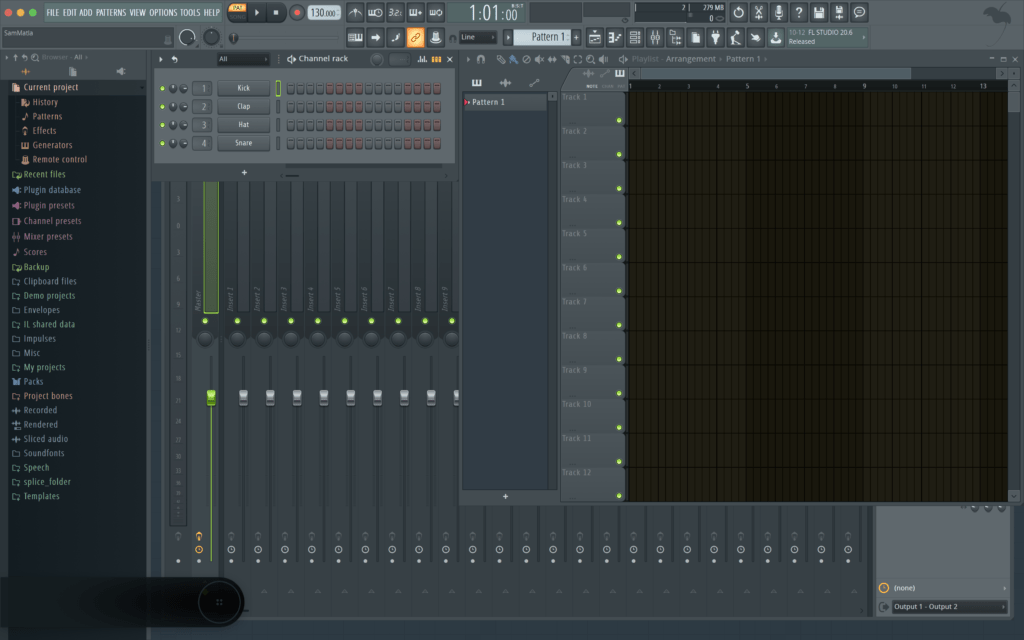
This is very important to consider if y'all are looking at committing to a DAW, because depending on your goals and workflow, different feature sets tin can brand a big deviation.
FL Studio: Feature Packed
| Version | Skilful For |
| Fruity Edition | Writing Loops and Melodies |
| Producer Edition | Fully-fledged software with full export adequacy |
| Signature Edition | Full software plus extra plugins |
| All Plugins Bundle | All plugins included made by Image-Line |
If you like options and don't become overwhelmed by confusing interfaces, FL Studio is the clear winner hither.
Want a mixer and step-sequencer on one monitor and arrangement on another? Easy. Desire 20 different virtual instruments included? Done. Desire FL Studio to make y'all breakfast? Information technology's almost probable possible.
The main difference that sets FL Studio and Ableton Live apart is that not all sounds are jump to an individual mixer aqueduct. It automatically assigns them in version xx, but you tin can still mix and match then that multiple sounds and instruments can be sent to the same mixer channel.
The same goes for the timeline. You can assign each audio to a track in the timeline, or yous can put patterns wherever the heck you desire.
One other major difference betwixt the features of FL and Ableton is the plugins. Both include an assortment of instruments of effects, only FL definitely wins in the quantity game, especially with the 'All Plugins Bundle'.
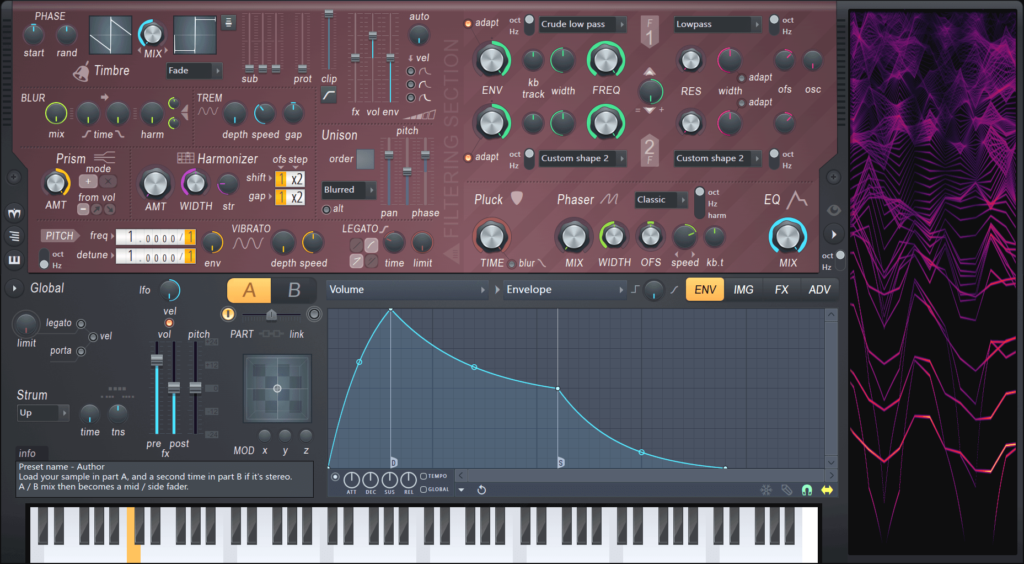
Harmor, for example, is an insanely powerful synth that has got years of development behind it, and Ableton is but just starting to catch up.
In that location are besides so many damn effects in FL Studio, and it breaks them down nicely into categories when yous get to load them in. You've got similar five different distortions, multiple EQs, and other random FX. Go nuts.
With countless routing options, effects, and sounds, you might be thinking 'I've made my decision now!' Simply tedious down. Sometimes, less is more.
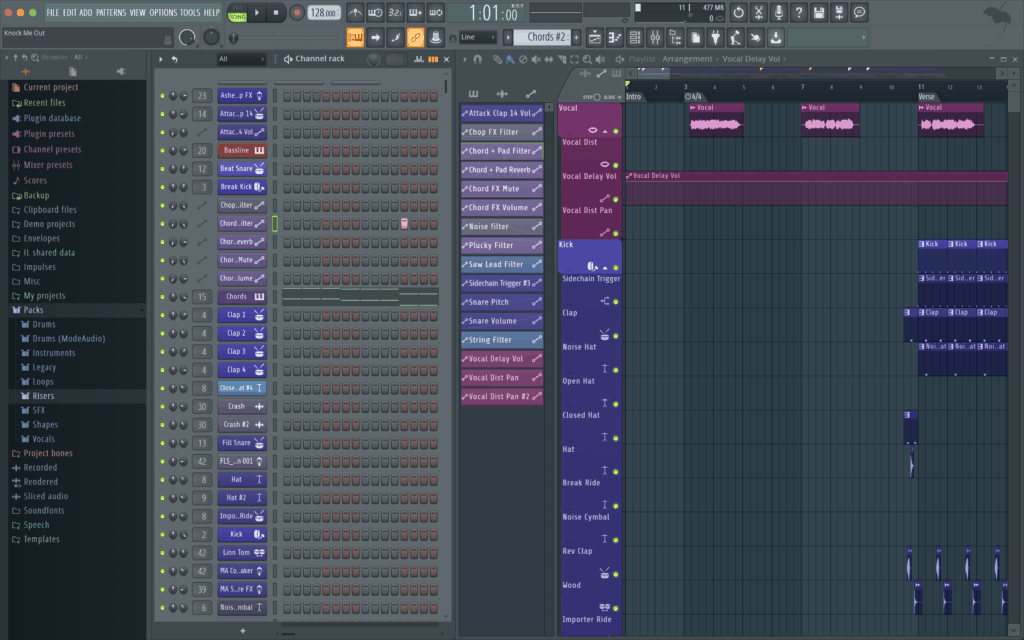
Recommended: FL Studio for Beginners – The Complete Guide
Uncomplicated, Streamlined and Able(ton)
| Version | Good For |
| Intro | Basic productions and looping, alive performance |
| Standard | Full production and alive performance adequacy |
| Suite | Total production capability with extra instruments and sounds |
Excuse the awful pun, merely Alive is a solid selection if y'all get overwhelmed with options.
Yes, there aren't 100 ways to practise the same matter, only what's there is quality, not fussy with sugary interfaces and just works.
On the left, you'll find the browser, similar in FL. It's resizable, just only to a certain degree, and it stays at that place. Everything is broken down into articulate sections, unlike the FL Studio long-rainbow madness.
The particular view is where the plugins and effects, audio and MIDI editor tin exist switched between. Unfortunately, y'all tin't have multiple at the same fourth dimension, but if you like focusing on one thing at a fourth dimension, information technology's not bad.
And if y'all demand things bigger or smaller, there is always zoom in the Wait/Experience preferences.
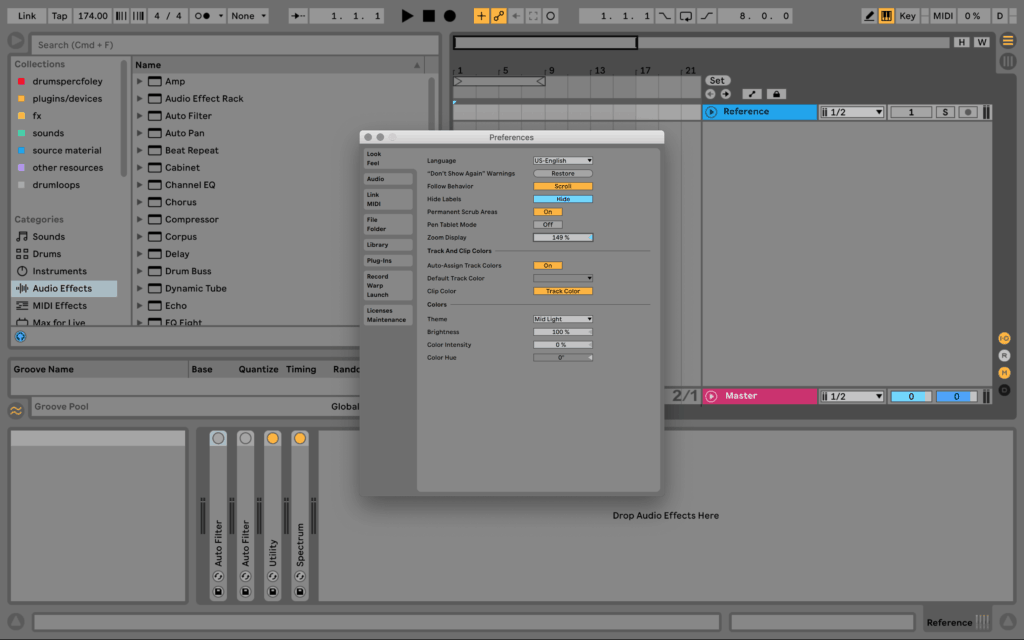
In the plugins/devices department, you lot get an array of very-capable synths like Operator, Analog and the newer Wavetable (a very legit Serum competitor).
While they are confined to the native interface, Wavetable has quite a dainty interface with expandable windows, and for some, the native interface makes the sound design process quite fluid.
Additionally, the Audio Furnishings in Ableton are actually damn proficient, with some nifty analog-inspired devices like Echo, Glue Compressor, and Amp.
Although FL wins at quantity, if you desire more curated devices, Ableton takes the block.
It notwithstanding also has great features, which you can check out in our video below:
Lastly, one thing that Alive tin can do very well that FL can't do to save its life is live operation.
The session view is an astonishing tool for live jamming, musical functioning and fifty-fifty DJing.
Recommended: 100 Ableton Alive Tips for Insane Workflow & Creativity
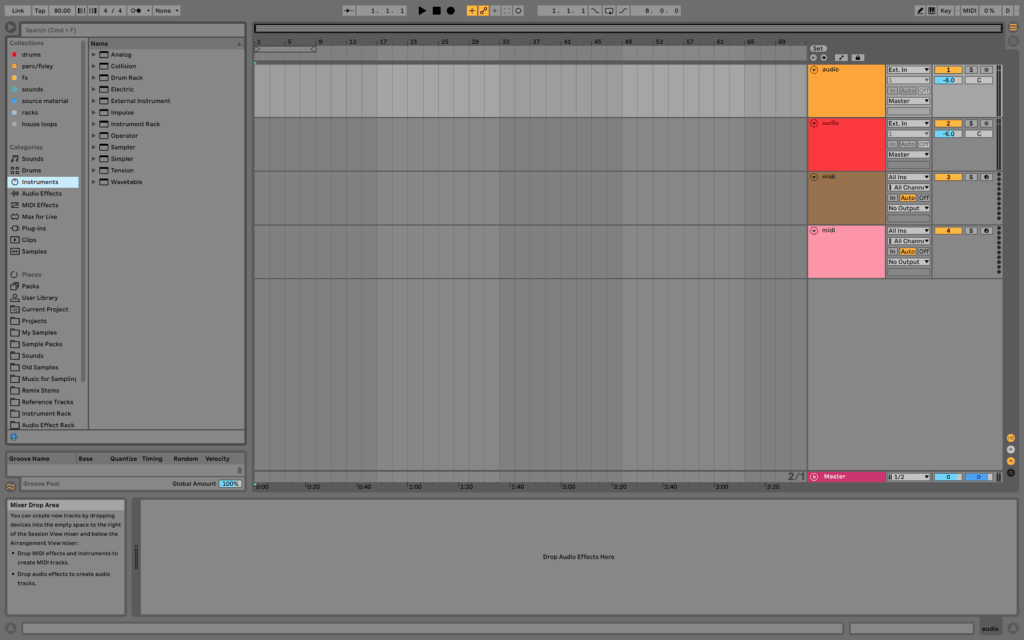
The Winner
For the number of features, FL Studio is the clear winner.
They jam-pack their software with and so much that you'll never run out of things to explore, which tin be a good or bad thing, depending on your workflow.
That beingness said, Ableton Live still has killer, high-quality features that makes it a more than capable DAW.
Get the headstart y'all need in music product with our EDM Starter Kit
Get our collection of high-quality presets, samples and PDF guides – suitable for all genres of electronic music.

Ableton vs FL Studio: Workflow
Workflow is incredibly important for being able to utilize your software in a practical way that delivers results. At that place isn't much point to using a DAW if y'all can't output music with information technology. Workflow is what takes yous from A to B.
FL Studio: x Ways To Do One Matter
Post-obit on from the features, we tin kinda assume that more features ordinarily ways a less articulate workflow. That tends to agree true in FL Studio, specially for beginners.
To really grasp FL Studio, it requires a lot more time investment into understanding the software and how to brand it work for you, which can be groovy.
It'south the dazzler of having flexibility – you can adapt it to your workflow.
Even though Ableton might exist easier to empathize from the commencement, FL may arrange your needs amend in the long-term, just with a niggling extra effort to figure things out.
This is why FL Studio suits some people so well, because they can conform it specifically to what they need, and this is even
Yes, Ableton has multi-monitor support, only with much less flexibility.
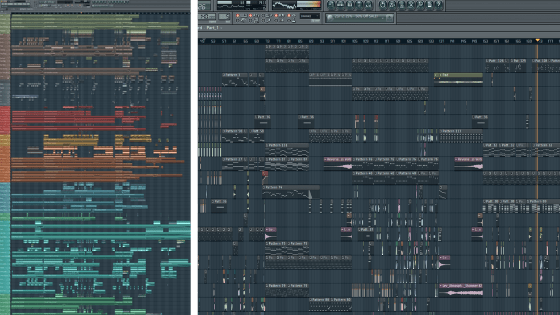
That being said, if FL Studio has one thing it's better at than Ableton Alive, it's the piano roll.
Information technology's style less clunky, has way more than MIDI editing tools and is easier to fit into the interface with the floating window.
Whereas in Ableton, the piano roll has to fit into the clip editor down the bottom. It's expandable just less so than in FL Studio.
Ableton Is Fast
If you desire a fast, articulate and creative workflow, Ableton wins.
While the device view might badger some people who similar bigger interfaces, the ability to bounce audio within tracks (Edison is by and large a nightmare in FL), saving things to racks and clips and using the session view for jamming, makes it worthwhile.
As per the features, the streamlined options makes things a lot easier to find. Here are a few highlights:
- FX Chains are visual and don't require opening plugins
- You tin create collections of your favourite samples/racks/any without copying the original file
- Racks are very intuitive and can be saved for ease
- Duplicating is easy and you don't take to switch tools
- Freezing and flattening audio is like shooting fish in a barrel
- Resampling can be done by setting input to Resampling, rather than exporting the whole track
That's merely a few things, only bank check information technology out for yourself. Coming from FL Studio, this was a game-changer for me.
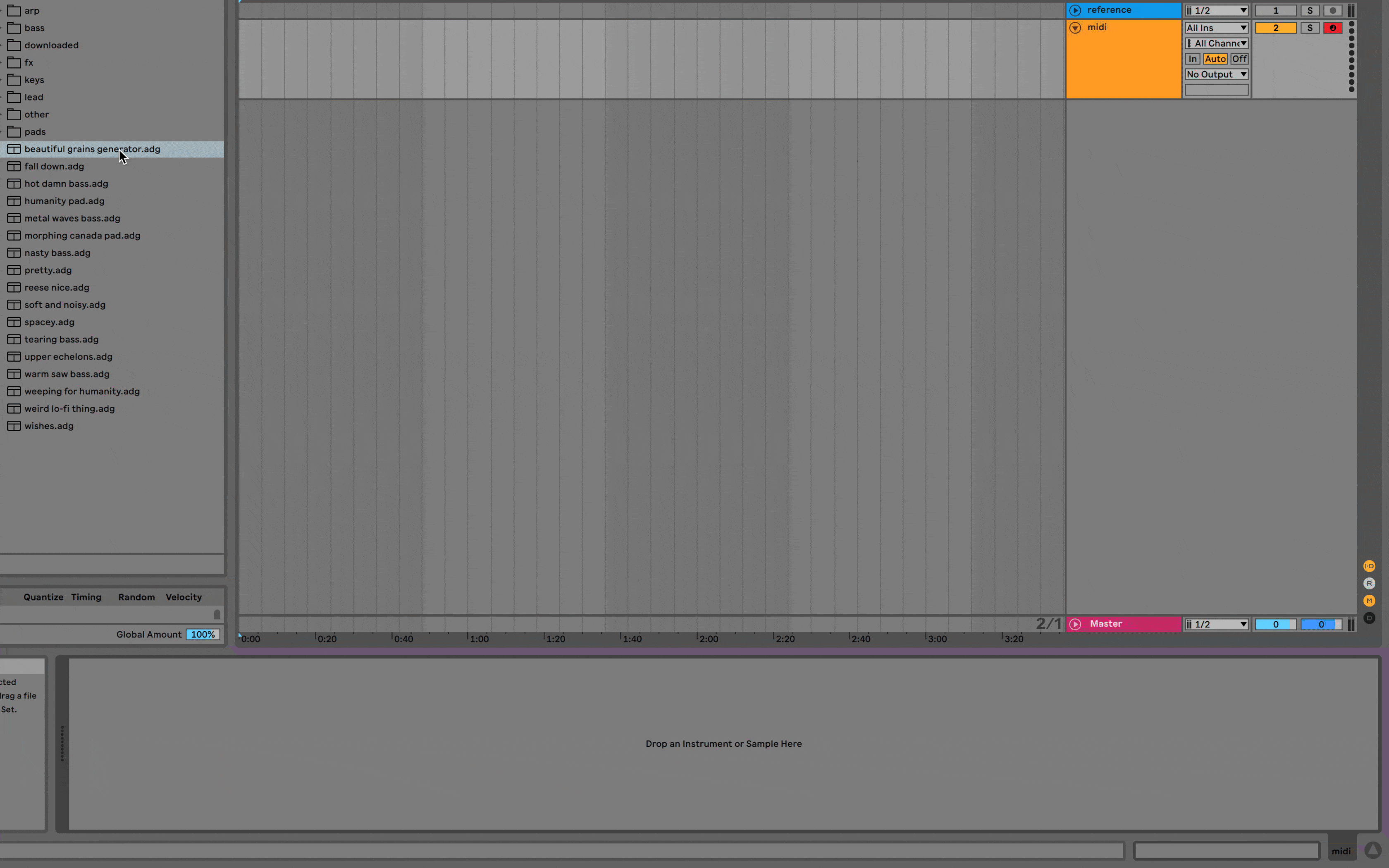
The Winner
For workflow speed, Ableton Live definitely wins this circular.
While workflow is subjective and changes between producers, Ableton'southward clear interface and intuitive tools definitely make information technology a cakewalk, peculiarly working with audio. If y'all like workflow options, FL might be the improve option.
You tin get the same results with both DAWs, but how yous get there also matters.
Ableton vs FL Studio: Compatibility
There's no point in using a piece of software if it doesn't piece of work on your setup. So to avoid you getting excited about the wrong DAW, make sure to read this section.
FL Studio's Mac Woes
Note: This is for the virtually recent version, FL Studio twenty. Cheque here for full compatibility info.
| Version | Uniform? |
| macOS (64bit) | Yep |
| macOS (32bit) | NO |
| Windows (32bit) | YES |
| Windows (64bit) | Yep |
| Linux | NO |
FL Studio has worked on Windows very well for a long fourth dimension. Information technology had a very fluid interface with very overnice graphics (and notwithstanding does, even more than so).
Historically, FL Studio was pretty determined that there wouldn't be a Mac version of FL Studio, mostly due to the coding language's incompatibility. Well, they've washed a 180 and now they have one. It works. Generally.

Equally the Mac version has grown from a sloppy, Windows-crossover edition into a fully-fledged piece of standalone software, in that location accept definitely been undeniable growing pains. Simply they've come up a long fashion.
Virtually features have been ported over (with some glitches included), merely there is no 32bit version of FL Studio for Mac, and your 32bit Audio Units won't work, even if your 32bit VSTs do.
Allow's be honest though, you lot probably should exist using a 64bit organisation, if you can.
If you're on a Mac though, there's always 32 Lives.
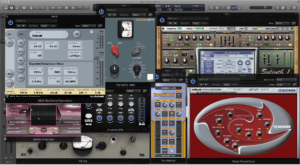
Credit: Soundradix
And as with nigh software, no native
on Linux, merely you tin can use an emulator if you desire.
Lastly, FL has gotten better on the CPU over the years. The vector interface is super dainty and isn't too much of a burden on the graphics carte.
Only the fancy GUIs tin can swallow up organization resources pretty fast, but that can happen anywhere if y'all are using third-party plugins.
Ableton: Groovy Compatibility, Infrequent Updates
| Version | Uniform? |
| macOS (64bit) | Yep |
| macOS (32bit) | NO |
| Windows (32bit) | NO |
| Windows (64bit) | YES |
| Linux | NO |
Note: This is for the most contempo version, Ableton Alive xi. Check here for full compatibility info.
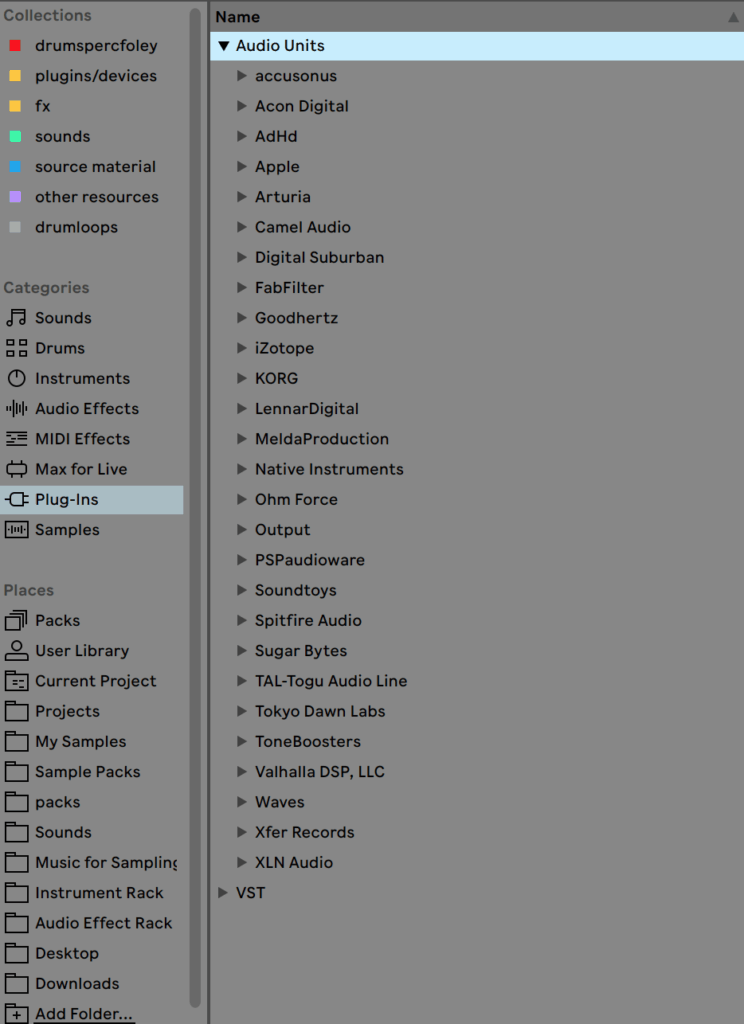
Up until Alive 10, Ableton supported 32bit systems. Now they have canned it, which makes sense, only yet might crusade problems for some people. If that's yous, make sure to grab a copy of Live 9 instead.
Although they seemed to have ramped up the updates in the terminal couple of years, whatsoever long-term Ableton user will tell you it isn't unheard of to non get a major update for a few years.
Whether this is a good matter or a bad thing is relative. Plus, most of the fourth dimension their minor updates will do the fox when information technology comes to glitches or software errors.
As well, all of your Audio Units and VSTs will work with Live just fine. They actually divide them into actually nice folders so it's pretty elementary to find what you lot're looking for, especially for Audio Units.
Y'all do need to go into the preferences and enable Audio Units though.
Equally of Live 10.1, VST3 is now supported too!
Ableton is pretty good on CPU and arrangement resources, equally it is designed for live functioning because you lot don't want to be getting dropouts in that setting.
Like any DAW, it can exist heavy on the CPU if y'all are using third-party plugins, but the native ones are very well-optimised.
The Winner?
In this department, it seems to be a tie.
Although FL Studio includes a 32bit version for Windows and supports both 32bit and 64bit VST on Windows, it's notwithstanding not quite there with reliability on Mac, which means they miss out on a large portion of their potential audience.
It is getting meliorate though, which means that long term, FL Studio may be the better choice.
In terms of plugin compatibility, FL wins that little scrap more than, because they've back up VST3 a lot longer than Ableton has, and they now support Sound Units and VST, which they previously didn't. FL is taking large strides.
Recommended: How To Use Ableton Live: The Producer's Guide
Get the headstart you need in music production with our EDM Starter Kit
Get our collection of loftier-quality presets, samples and PDF guides – suitable for all genres of electronic music.

Ableton vs FL Studio: Resources and Support
Learning a DAW is a massive effort, and it's not easy. In fact, music product, in full general, isn't easy. But having resources helps.
Ironically, p
of my job is finding keywords that people similar you are searching for, and so we can create helpful articles effectually those topics.
Hither'south what happens when I blazon in FL Studio and Ableton into Google Trends.
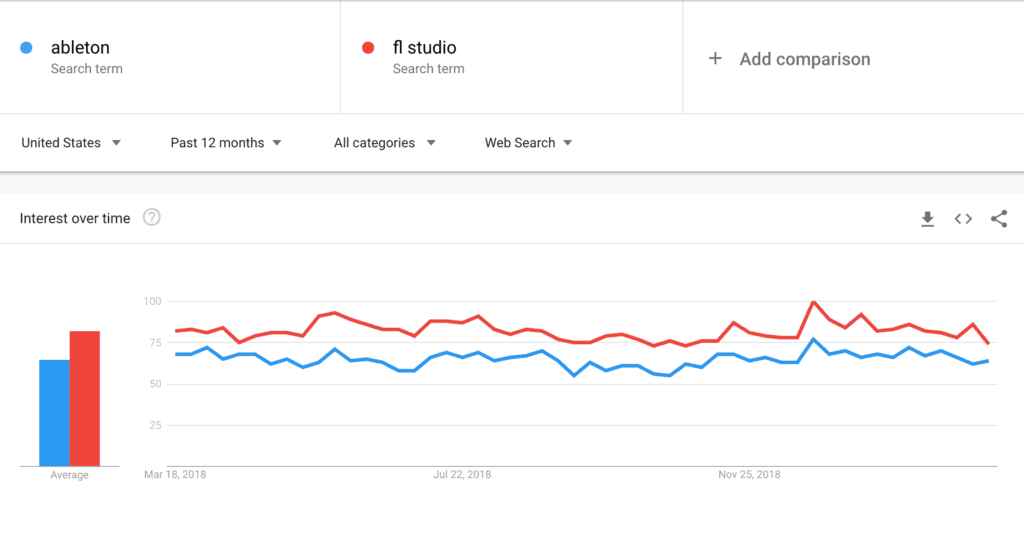
Quantity of Resources: FL Studio
If y'all want lots of videos, articles and support, FL Studio is your best option.
But due to the popularity of the DAW within the electronic music world, it's got the history and support of a lot of users. Information technology'southward also been out longer than Ableton Live.
Most tutorials on YouTube for electronic music and hip-hop are done in FL Studio. So searching how to do something volition usually requite you a tutorial in FL Studio, like how to recreate a certain sound, or brand a certain genre.
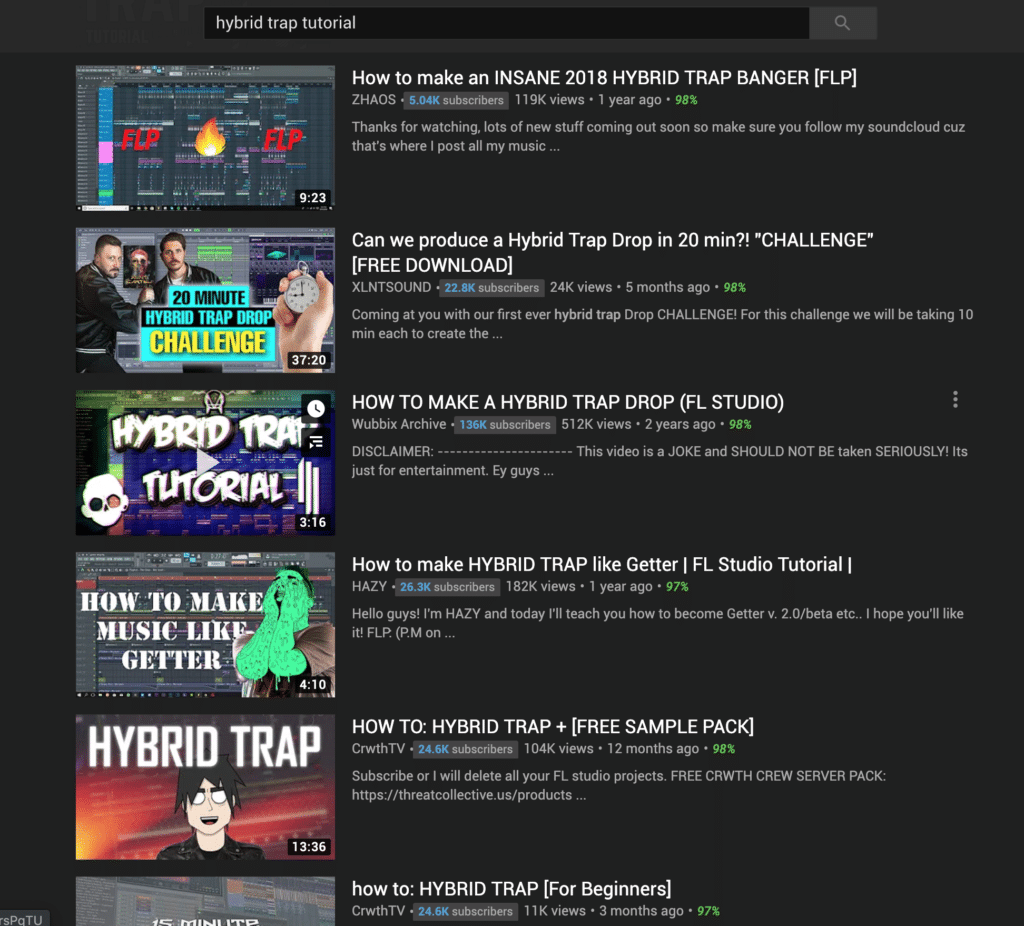
The client support that Paradigm-Line provides is overnice, although there is no direct number, unfortunately.
Apart from learning, there aren't equally many native resources for actual production (like presets and sounds) bachelor in comparison to Ableton, generally due to Ableton'south superior rack format of grouping instruments and FX together.
Simply you can save effect chains and instruments every bit presets, and so there is still definitely stuff out in that location.
Near audio formats are compatible with FL, and
tin can be loaded into the Fruity Soundfont Player, if you're still into those.
Quality of Resource: Ableton Alive
Ableton might have fewer resources, but what it does have is high-quality resources, peculiarly in the way of YouTube tutorials.
The Ableton team has a great YouTube channel with examples and guides to help you. Plus, 90% of our courses are washed with Ableton Live.
They as well have a smashing, comprehensive yet simple transmission available for gratuitous. In fact, it's probably one of the best manuals bachelor for whatever production or service I've seen – period.
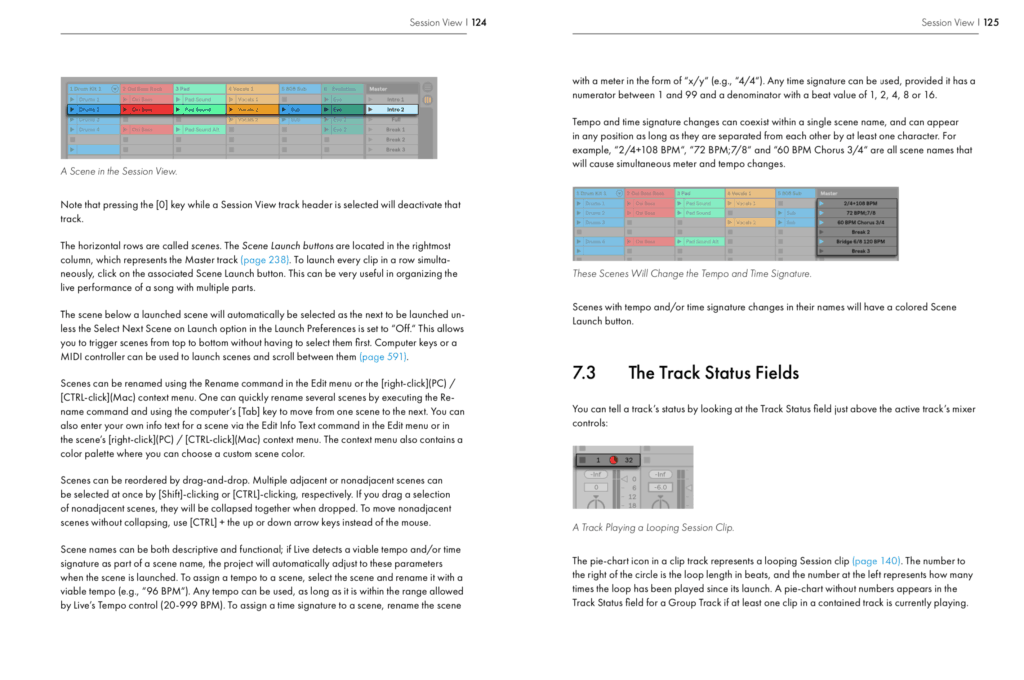
Ableton customer support is also pretty nice, although I haven't needed to employ it much, to be honest. One time once more, in that location is no directly telephone line, unfortunately.
In add-on to educational resources, Ableton has groovy racks, clips, and project files available for purchase or download across the web.
The instrument, audio upshot, and MIDI racks brand audio blueprint a lot easier to larn and sounds a lot simpler to replicate.
Of class, samples aren't DAW-specific, simply Ableton supports most file formats and even non-native formats similar soundfonts and EXS24 for Logic Pro.
Recommended: All-time MIDI Keyboards
The Winner
FL Studio wins this one for resource.
Mainly due to the popularity and age of the DAW. Only information technology'south close, and you can't really go wrong with either. In reality, both take enough resources for you to acquire the DAW from a beginner level all the way to the advanced level.
Get the headstart you demand in music production with our EDM Starter Kit
Get our collection of high-quality presets, samples and PDF guides – suitable for all genres of electronic music.

Ableton vs FL Studio: Price
You might be asking, why did you leave pricing to concluding?
Before looking at the cost, know that the DAW you choose is a long-term investment.
You might be tempted to make the decision on price lone, only consider what suits your workflow style.
Originally I tried out FL Studio because information technology was cheaper.
Ableton: Expensive and Worth Every Penny
| Version | Price (USD) |
| Intro | $99 |
| Standard | $499 |
| Suite | $799 |
While the opening price of Ableton is comparable to Ableton, the 'principal' version (Ableton Standard) is a lot more expensive.
Over double, in fact.
At present if you're on a budget, Ableton Standard might exist out of the question for you, solely based on that.
Simply make sure to effort the demo beginning, you lot might be inclined to beginning on Intro and work your way upwardly from there.
The Suite version is cheaper for the full-featured version with all devices (in comparison to the FL Studio All Plugins Bundle), but one thing you don't become is free lifetime updates.
Of course, minor updates you lot will get, but for major version updates, you'll be forking out
FL Studio: Cheaper, Dandy Value and Characteristic-Packed
| Version | Price (USD) |
| Fruity Edition | $99 |
| Producer Edition | $199 |
| Signature Bundle | $299 |
| All Plugins Packet | $899 |
It doesn't brand sense, but FL Studio is insanely adept value for coin, especially for the Producer Edition. $199 for a pro-level piece of software is a bargain.
Although the All Plugins Bundle is just that bit more in comparing to Ableton Live Suite, in all other areas FL wins on price.
But that's not even the best function.
Gratis lifetime updates. Yes, that'due south right. Forever. Ableton tin't fifty-fifty compare to that. Plus, FL seems to have slightly more consequent updates.
Remember though, price isn't everything.
The Winner
The obvious winner in this section is FL Studio by a country mile.
$199 USD for a full version (Producer Edition) is pretty much nada compared to $499 USD for Ableton Standard.
That existence said, if you are the kind of producer who wants to splash on the extra plugins/devices, and then Suite is $100 less than the top-tier version of FL Studio.
The Verdict?
Then who wins overall?
Fox question.
At the start, I said that there is no 'best DAW' and that still holds true. Both have pros and
That being said, if I had to cull i for each kind of producer, I would choose FL Studio for the producer who likes to customize everything, and I'd choose Ableton Live for the producer who likes a fast workflow.
The side by side thing you should exercise is download a demo of ane, or both. That way you can test these things for yourself and make a final decision.
The last thing you want to practise is commit without feel.
Remember, there are other DAWs you might want to consider too.
What Now?
Well, if you are inspired to take hold of a demo or get off testing these bad
Just yous'll also need more than just a DAW – y'all'll need samples, sounds and helpful guides.
That'south why nosotros put together our free EDM Starter Kit, jam packed with high-quality samples, presets and some of our best PDF resources here at EDMProd.
Get the headstart you lot demand in music production with our EDM Starter Kit
Get our drove of loftier-quality presets, samples and PDF guides – suitable for all genres of electronic music.

Also, choosing a DAW is probably 1 of the nearly important decisions yous will make in your production journey, so choose carefully.
Switching afterwards downward the rail is possible, but it's more difficult and is avoidable.
If you need more info on other DAWs, cheque out our complete DAW guide. Or, this article from our friend Rob at Musician on a Mission. Or, if yous're on a budget, check out some complimentary DAWs.
Lastly, what did we miss well-nigh Ableton or FL Studio? Let us know in the comments or by dropping me a line at [email protected].
Source: https://www.edmprod.com/ableton-vs-fl-studio/
0 Response to "Can You Pick Piano Up Again"
Post a Comment